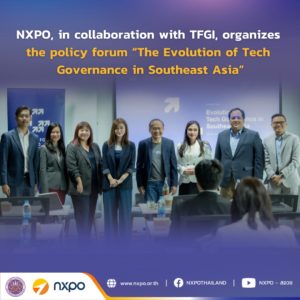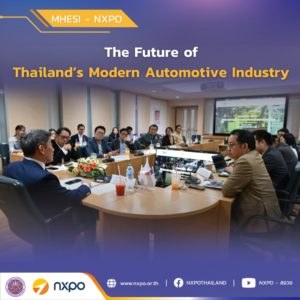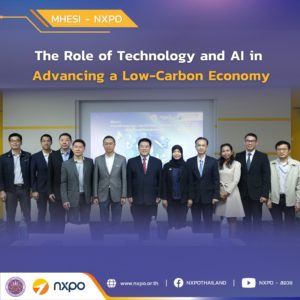
Office of National Higher Education Science Research and Innovation Policy Council (NXPO), in collaboration with the Program Management Unit for Competitiveness (PMUC), Suan Sunandha Rajabhat University (SSRU), under Ministry of Higher Education, Science, Research and Innovation (MHESI), the Thailand Energy Storage Technology Association (TESTA), and the Electric Vehicle Conversion Association of Thailand (ECAT), organized a “Strengthening Battery Industry and Value Chain: Thailand-China” activity from 23 to 27 April 2024. The study tour brought together 55 representatives from 36 organizations in Thailand, including 29 companies, 6 government agencies, and 1 academic institute, to Shenzhen, China. The delegation attended the 16th Shenzhen International Battery Industry Exhibition, also known as the China International Battery Fair (CNIBF), engaged in business matching and workshop activities, and visited battery manufacturers.


On 24 April, the delegation visited CNIBF, an international event for the battery and energy storage industry. The fair showcased products and technologies such as battery cells, portable charging stations, stacking energy storage systems, and DC and AC control systems.

During the visit, a memorandum of understanding between NXPO and CNIBF was signed by NXPO Vice President Siriporn Pittayasophon and Mr. Li Ming Yang, General Manager at Guangzhou Zhenwei International Exhibition Co., Ltd., representing CNIBF. The MOU aims to facilitate delegation’s visits to exhibition showcases and battery factories, support the business matching and workshop activities, and promote information dissemination. Dr. Siriporn stated that this partnership will help strengthen research and innovation in battery technology between the two countries, with NXPO committed to providing its expertise to drive cooperation. CNIBF expressed its commitment to supporting exchanges and business development in the new energy sector, expecting a long-term partnership







Following the MOU signing, the “Thailand-China Battery Industry Value Chain” session was held, providing insights into the battery industry landscape in Thailand for fair visitors. Topics included the “Strengthening Battery Industry and Value Chain: Thailand-China” project presented by Asst. Prof. Dr. Pantip Kayee from Suan Sunandha Rajabhat University, R&D funding in Thailand presented by Assoc. Prof. Dr. Watcharapol Chayaprasert from PMUC, battery value chain presented by Prof. Dr. Nonglak Meethong from Khon Kaen University, and electric vehicle conversion industry in Thailand presented by Dr. Thanakarn Wongdeethai, NXPO Strategist and ECAT President.




Another highlight of this event was the business matching activity, with 37 Chinese companies exploring business opportunities with 29 Thai companies.
On 25-26 April, the Thai delegation visited four battery manufacturers, representing players from upstream to downstream of the battery production:
- EVE Energy Company Limited: Established in 2001, EVE is a global leader in the lithium battery industry. The company was first listed on the Shenzhen GEM (Green Eco-Manufacture) in 2009. In 2022, it became an original equipment manufacturer (OEM) for BMW and DAYUN, providing battery and energy solutions, particularly on the Internet of Things (IoT) devices. EVE manufactures various types of products, including Li-SOCl2, Li-MnO2, capacitor, super capacitor, pouch cell, cylindrical cell, bean cell, prismatic LFP cell, prismatic NCM cell, pouch NCM cell, and EV – cylindrical cell, supporting multiple industries. The company’s research center employs over 3,100 research staff members focusing on material research, electrochemical reactions, structural design, and electronic circuit design. The center has over 5,870 patents registered in China.
- Sunwoda Mobility Energy Technology Company Limited: Established in 1997, Sunwoda is a world leader in lithium-ion battery technology. The company’s business includes 3C batteries, electric vehicle batteries, energy services, smart hardware, smart manufacturing solutions, industrial IoT, and testing services. Sunwoda also manufactures OEM parts, with a primary focus on batteries for household appliances. Sunwoda founded a research institute, demonstrating its commitment to research and development.
- Guangzhou Great Power Energy & Technology Company Limited: The company was established in 2001 and listed on the stock exchange in 2015. It manufactures battery cells, battery packs (PACK), battery racks (RACK), outdoor energy storage systems, containerized energy storage systems, and other products for various brands. The company prioritizes safety in its products, claiming no accidents caused by its products. It ranks fifth in the world for corporate energy storage solutions and second for home energy storage solutions.
- Huawei Digital Power Technology Company Limited: The company provides digital power products and solutions. By integrating digital technology and power electronics, the company develops clean energy technology, offering a comprehensive range of energy management products, including fusion solar, power supply, site power facility, powertrain, and embedded power.




On 27 April, a workshop was held, providing an opportunity for the Thai delegation to share insights and review lessons learned from the study tour. The workshop featured the following presentations: 1) electric vehicle conversion industry by Dr. Thanakarn Wongdeethai from NXPO/ECAT, 2) R&D funding by Assoc. Prof. Dr. Watcharapol Chayaprasert from PMUC, 3) energy storage and applications by Assoc. Prof. Dr. Werachet Khan-ngern from King Mongkut’s Institute of Technology Ladkrabang, 4) battery value chain by Prof. Dr. Nonglak Meethong from Khon Kaen University/TESTA, 5) business models for the battery industry by Mr. Pariphat Buranasin, Managing Director at Gewinn Consulting Co., Ltd. and ECAT Vice President.

During the workshop, participants also discussed constraints and proposed recommendations to promote the battery industry in Thailand, including streamlining import permit applications, import tax exemptions for research and testing, regulations and standardization, an inclusion of open protocol in the ASEAN-China Free Trade Agreement negotiation, and incentive measures dedicated to the battery industry.






















